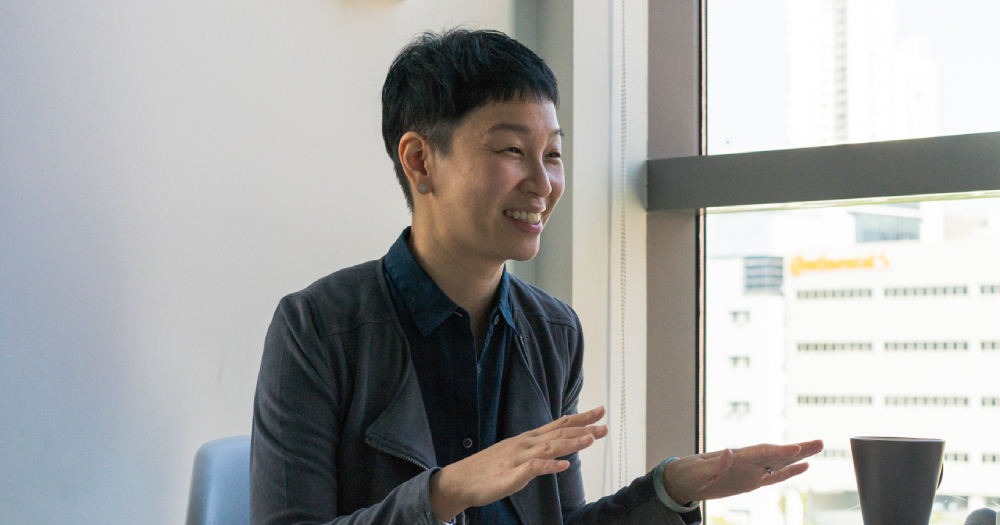On June 19, a government gazette confirmed news that had broke 2 days prior: Red Dot United (RDU) had officially become Singapore’s newest political party.
And with that, the latest chapter in Michelle Lee’s political career — a career she told Mothership was one she fell into by accident — began.
On the day we met for our interview, Lee — the chairman of RDU — excitedly pulled two circular discs from her bag. The plastic badges, adorned with RDU’s just-approved red and white compass logo, were the first two ever made.
In fact, the 43-year-old had made them herself, with a badge-making kit she’d bought off Carousell.
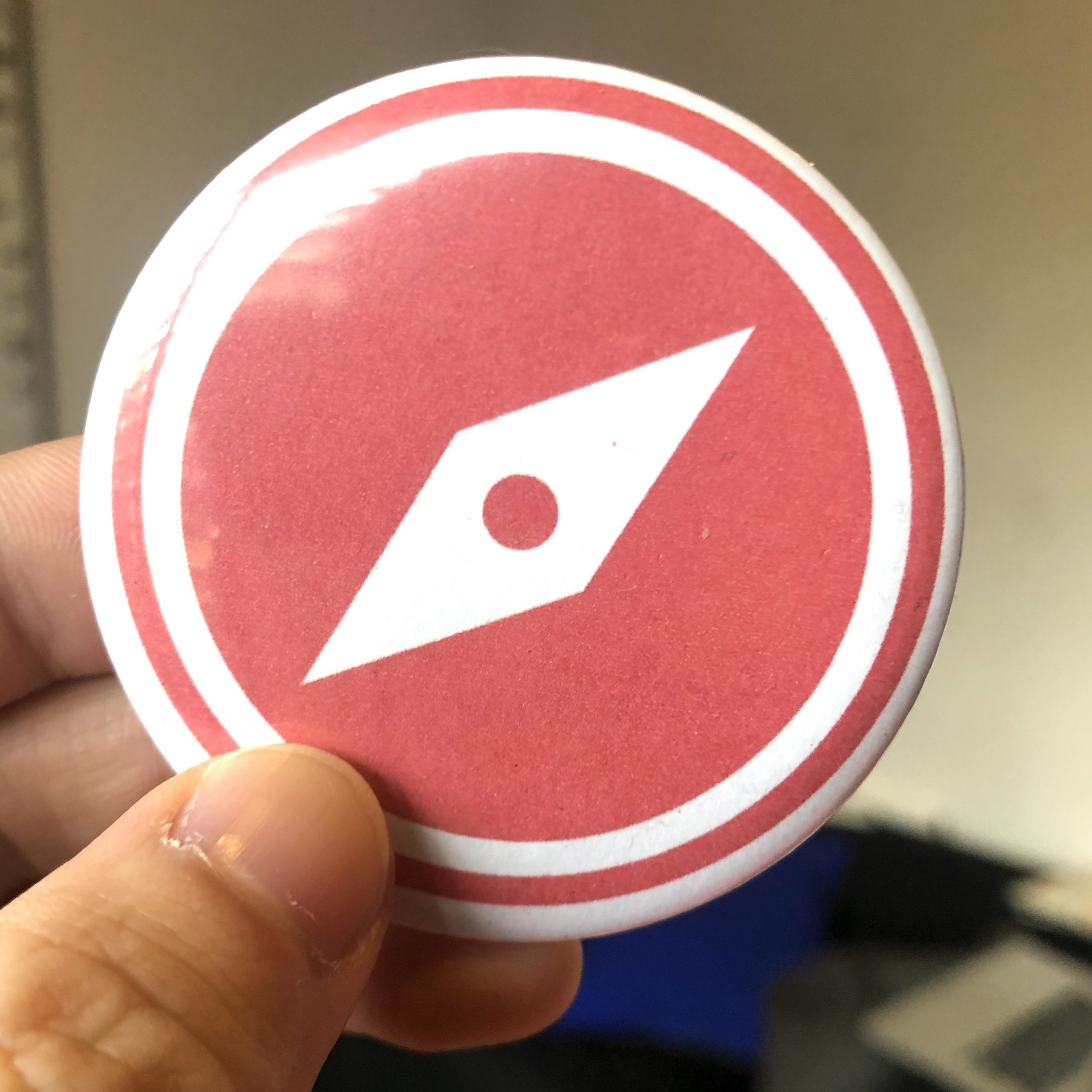 Image by Andrew Koay
Image by Andrew Koay
It’s all moving at breakneck speed for the party, whose application to the Registrar of Societies was only filed less than a month prior to approval on May 26. In fact, at the start of May, RDU's secretary-general Ravi Philemon was still a member of the Progress Singapore Party (PSP).
Lee, herself, was vice-chairman of the PSP until her resignation and withdrawal from the party in March, saying that she wanted to spend more time with her family.
The mother of three readily admitted that her decision to leave the PSP only to start a new party in the span of a few months might appear to some as a bit of a head-scratcher.
But Lee is used to doing things that may seem offbeat or even eccentric — just ask her classmates at Raffles Junior College who would’ve watched her pull up to class on her motorcycle.
“I’ve always been outspoken, and I’ve always not minded doing things that are a bit strange,” she told me without breaking from the warm smile that seemed permanently etched into her face.
Political awakening in university
The eldest child of two ExxonMobil employees, Lee grew up in the Farrer Road area and attended Raffles Girl’s School (primary and secondary) after gaining entry through the Gifted Education Programme. Despite her parent’s generally easygoing attitude — which Lee attributes to them both being the youngest child in their families — they did not love the idea of their daughter riding a motorcycle.
Determined to do so anyway, Lee worked two to three nights a week, at the Night Safari as a tram commentator, to pay for her Suzuki RG125.
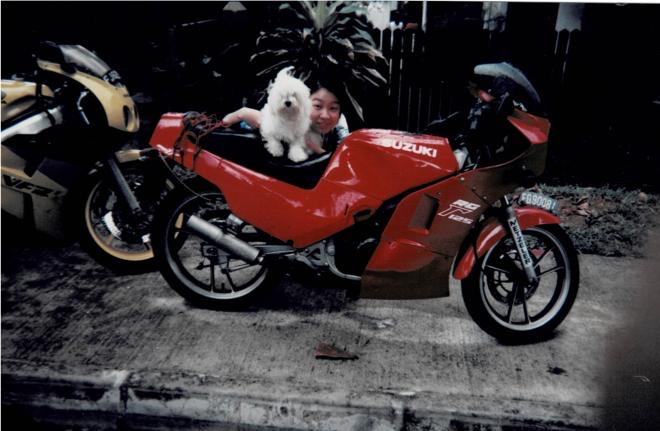 Image courtesy of Michelle Lee
Image courtesy of Michelle Lee
That early inkling of a defiant streak, however, did not apply to politics which Lee says she had no awareness of until her university days in the United Kingdom, where she attended the London School of Economics and Political Science from 1995 to 1998.
“No, absolutely none,” she said when I asked her about any early memories she had of politics before university.
“I’ll tell you why. Firstly, because we never had to vote. I don’t believe my parents ever had to vote and they never talked about politics.
I think that my parents generation they were very effectively deterred from speaking about politics with their children because they didn’t want the trouble. They had seen with their own eyes what would happen to people who were too active. And I think that was very, very powerful.”
It took a university class on political science, for Lee to experience an awakening of sorts. She recalled the very first session, where students were asked to introduce themselves to their fellow classmates along with what kind of political systems they were familiar with in their home countries. Lee did so by announcing that she was from Singapore, a democracy.
She soon began to see that things were not so clean cut.
“You know it’s a democracy, because it’s in the pledge but by the end of the class, I realised that we were an illiberal democracy or we were like — you know, there are different categories of democracies. And we were not really like a normal one.”
The class opened Lee’s mind to a whole range of theories and perspectives that she had never fathomed before — "I was just shocked that I had never known all this and that had never even been a topic of conversation with my friends or family”.
Ditching a glamorous career
Lee would continue her journey of discovery and politicisation over the next decade as she discovered increasingly how politics influences everyday life.
Lee went on to earn her Bachelor of Science in Government and Economics, achieving first class honours in the government component of the degree, before working in the Monetary Authority of Singapore, an investment bank, and then a consulting firm in Hong Kong.
Her time in Singapore’s central bank, she said, gave her exposure to policy considerations, while working in the investment world gave her a sensing of how the country’s sovereign wealth was being invested. Her time in Hong Kong — whose governance Lee describes as “very consultative” — gave her another view of how a government and its constituents could interact.
But perhaps most formative were her experiences as a teacher and mother.
Lee eventually left the glamorous lifestyle of the financial sector to receive her teacher training at the National Institute of Education.
Reflecting on the move, she said:
“[The financial sector] was fun — you get a good salary, you fly business class, you meet like bosses of company. But it wasn’t so… I don’t know I just wasn’t so passionate about it.
It was a struggle because when I switched to teaching, obviously the pay is a lot less. And the prestige is a lot less. It wasn’t an easy decision. But I don’t regret it at all. I love teaching.”
Lee taught at New Town Secondary, Bukit View Secondary, and then the Singapore International School in Hong Kong, after her husband’s work saw the family move to the special administrative region.
Being a "political awareness activist"
Her time as an educator and the birth of her children, made Lee more attuned to what she identified as deficiencies in Singapore’s education system.
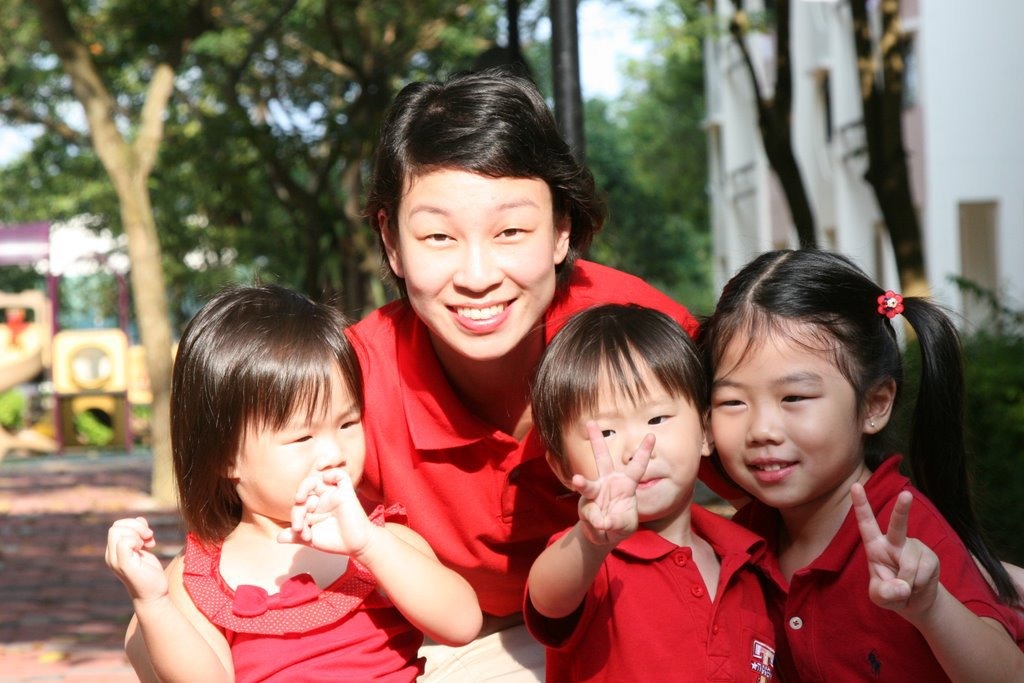 Lee and her children. Image courtesy of Michelle Lee
Lee and her children. Image courtesy of Michelle Lee
Add to the mix the rest of her journey from political ignorance to awareness and you have the foundations of a political platform. As Lee puts it, all her experiences helped her see that things could be better:
“I feel that we’ve dis-empowered our young people. It’s even more noticeable if you’re not in those schools who are given opportunities.
You need to be equipped with that confidence that your opinions matter, and that you should speak up about them. That it’s part of your duty as a person and citizen of a country.”
According to Lee, Singapore’s education system and society’s general disposition to avoiding the subject of politics are hindering the next generation from developing the critical skills needed to compete internationally.
What is needed, Lee decided, is greater awareness of different points of views rather than a blind acceptance of the government’s rhetoric. This has underpinned her political career thus far.
“I like to think of myself as a political awareness activist rather than a politician,” Lee said, “or at least that’s what I’m passionate about.”
“Many things in Singapore actually are affected by political motivations. We just don’t realise it. And because it impacts every aspect of your life, when you don’t discuss it and put it on the table and you don’t know what led to it, there’s a whole part of you that’s missing.”
At multiple points during our chat, Lee emphasised the importance of having a plurality of perspectives.
“I want it to be where we can have different views, and it’s fine. We can still be friends and we respect each other, and we’re richer for it,” she said
At another point, she passionately posited that it is healthy to keep the ruling party “on their toes”.
“They need to compete, you know?
If competition is good in other aspects for Singapore — to the extent that you tell Singaporeans that it's right that they compete with people who come from all over the world to work here, then how can it be that competition is not good in politics?”
Standing for elections in 2011 with SDP
These are not just intellectual fodder for Lee. In 2011, having moved back to Singapore after the birth of her twins, she decided to volunteer with the opposition party running in her constituency (Holland-Bukit Timah GRC) — Chee Soon Juan’s Singapore Democratic Party (SDP).
“I think that the opposition should have a chance, otherwise you only hear one story,” she explained.
She started by handing out fliers, but her role in that election would escalate quickly — something of a trend in her political career.
More candidates was needed to facilitate the SDP’s plan to send a team to contest Sembawang GRC, so Chee sat down with Lee and asked if she would consider standing for election in Holland-Bukit Timah.
“‘Don’t worry, nobody will even know that you’re a candidate, because the mainstream media is not going to want anybody to know anything about you and people are just going to avoid you when they see you coming,’” Lee recalled the party telling her.
“So then I was like ‘No one will know I am running?’” she said between giggles. “Okay, I will sign on.”
Ironically, it was through the newspapers that Lee’s parents eventually found out she was standing for elections.
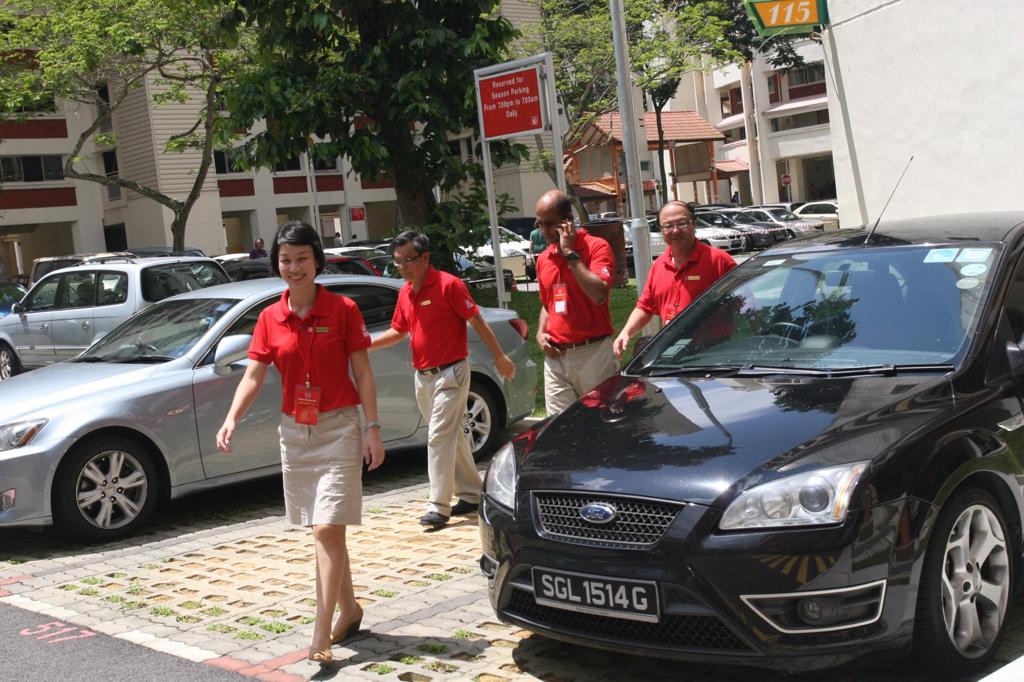 (L to R) Lee and Tan Jee Say, Vincent Wijeyeisingha, and Ang Yong Guan. The SDP's team to contest GE2011 in Holland-Bukit Timah. Image courtesy of Michelle Lee
(L to R) Lee and Tan Jee Say, Vincent Wijeyeisingha, and Ang Yong Guan. The SDP's team to contest GE2011 in Holland-Bukit Timah. Image courtesy of Michelle Lee
If it all sounds a bit impulsive — and there seems to be at least a sprinkle of that — Lee assured me that she counted the cost.
She explained that many people shied from entering opposition politics out of a fear that it would affect their careers, or the careers of their loved ones. Some were even with threatened with divorce by their spouses, she said.
Fortunately, Lee's circumstances meant she did not have those fears lingering over her head; her husband was still working in Hong Kong, and her parents were retired.
And so in 2011, Lee stood in a team that included SDP veteran Vincent Wijeyeisingha and fellow political newcomer Tan Jee Say, to participate in Holland-Bukit Timah's first electoral contest (the GRC's first election in 2006 was a walkover).
While GE2011 proved to be a pivotal event in the history of Singapore's electoral politics, Lee's SDP team fell short; they lost to a PAP team led by Vivian Balakrishnan, who earned just over 60 per cent of the vote.
Yet Lee doesn't think of the experience as a failure. "I always look at it with a glass half-full (perspective)," she told me.
"I was really grateful to get back my election deposit! (Laughs) And you know the fact that things did change after the vote share for the opposition went up."
Forming a friendship with Tan Cheng Bock, joining PSP
She also walked away from the elections with a newly-formed friendship with Tan.
When he decided to run for Singapore's presidency later that year, the former civil servant asked Lee to be his assistant campaign manager.
"I did discourage him (from running)," Lee said.
She felt that there were already other viable candidates, and that it might have been more productive for Tan to set his sights on the next general elections instead.
"But he had his reasons for doing so, and when he asked for help, as a friend, I helped."
The election saw three other Tan's competing with Jee Say for the presidency: Tony, Cheng Bock, and Kin Lian.
Of the four, former deputy prime minister Tony Tan eventually won the election by the slimmest of margins pipping another former PAP member of parliament Tan Cheng Bock by less than one per cent of the vote (35.2 per cent vs. 34.85 per cent).
Tan Jee Say came in third with about 25 per cent of the vote.
Lee's memory of the presidential election couldn't be in starker contrast to how she views the general election.
"Of course with hindsight, we would have done things differently," she admitted.
Lee and her husband later extended an invitation to Tan Cheng Bock to come to their house for dinner.
"He graciously accepted, and came over with his wife. And we said to him we were very sorry that he had lost by such a narrow margin."
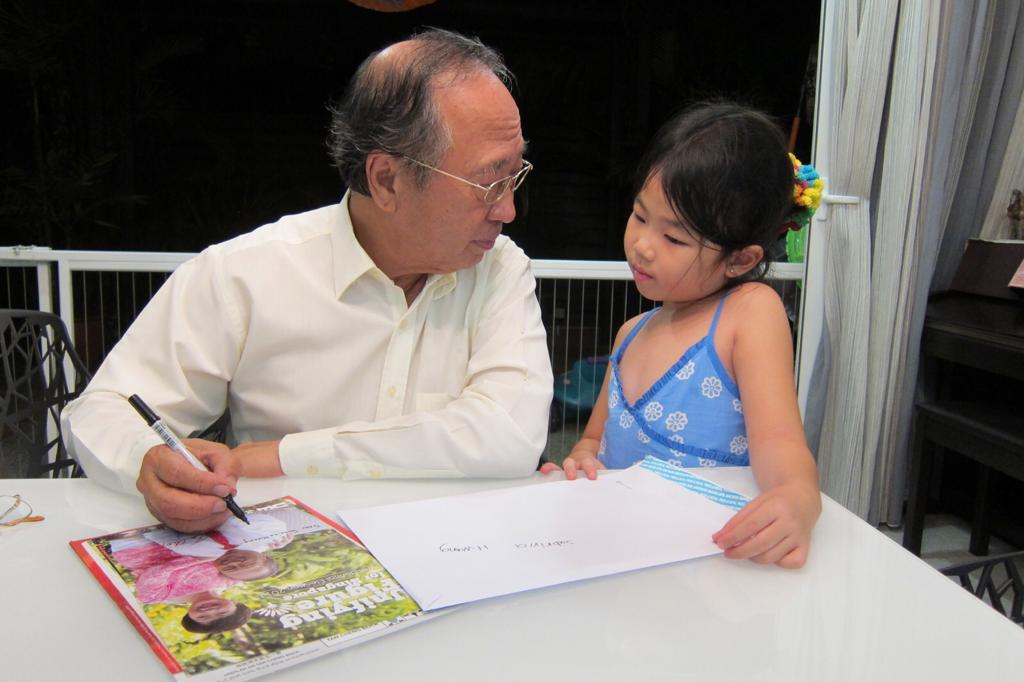 Tan Cheng Bock and Lee's daughter. Image courtesy of Michelle Lee
Tan Cheng Bock and Lee's daughter. Image courtesy of Michelle Lee
The dinner must have left quite the impression on Tan, who kept in contact with Lee over the years and subsequently invited her to be a founding member of his new political party, the PSP, in 2019.
She soon assumed the role of vice-chairman, before leaving the party in March earlier this year.
Lee said that running the party's extensive operations eventually burnt her out and consumed any free time she would have had to spend with her children or pursue her interest in counselling.
At the same, Lee hinted that newer members of the party had different ideas — ideas that she might not have agreed with — as well as more energy to carry them out.
"So you know, I just thought that it was hard to sustain for me. I was at meetings every night, and my kids were actually saying 'can you stop this?' So I thought okay yeah, it seems to make more sense for me to step out at this point in time."
Covid-19 revealed the government's blind spots
If you're keeping count, by this point in time, Lee has worked relatively closely with three big figures in the landscape of Singapore's opposition politics: Chee Soon Juan, Tan Cheng Bock, and Tan Jee Say (the last went on to form the Singaporeans First party).
However, she indicated that she wouldn't be incorporating much from their styles of leadership in her newly-minted party.
"I think something that we would like to do at RDU is move away from personality-centred politics. That's why we espouse principles and values, but with the common understanding about what these stand for."
Personality-centred politics, in the style seen commonly throughout Singapore, Lee explained, is not sustainable as it is tied too closely to that individual's self-belief.
"It leaves a gap. It means that continuity is less certain. Because if it's all tied up with that person, then when that person is no longer there, there's a vacuum."
She pointed to Lee Hsien Loong's fourteen years as Singapore's prime minister: "And now we're like stuck, because 'oh, what happens when he goes?'"
Turning her attention to the ruling party's handling of the Covid-19 pandemic, Lee said, "Of course it's not an easy situation. People didn't know it was coming."
However, Lee felt that there was too much of an emphasis from the government on "saying look how well we've done", a move she said was "premature".
"I think Covid-19 pandemic has shown us that they make mistakes. And then it's also interesting to see how someone deals with a mistake. Do you reflect on what you've learned and how you can do better? I think they would say that they have, but I think they stopped short of going really deep."
According to Lee, this problem stems from a sort of 'groupthink' that she believes is developing among the PAP's top brass. Citing an article that she'd recently read on BBC, Lee suggested that dissenting voices within the ruling party may be dissuaded from offering alternative solutions to the pandemic due to a fear of looking stupid.
"They definitely have blind spots. And what you need sometimes, is another voice to point that out to you."
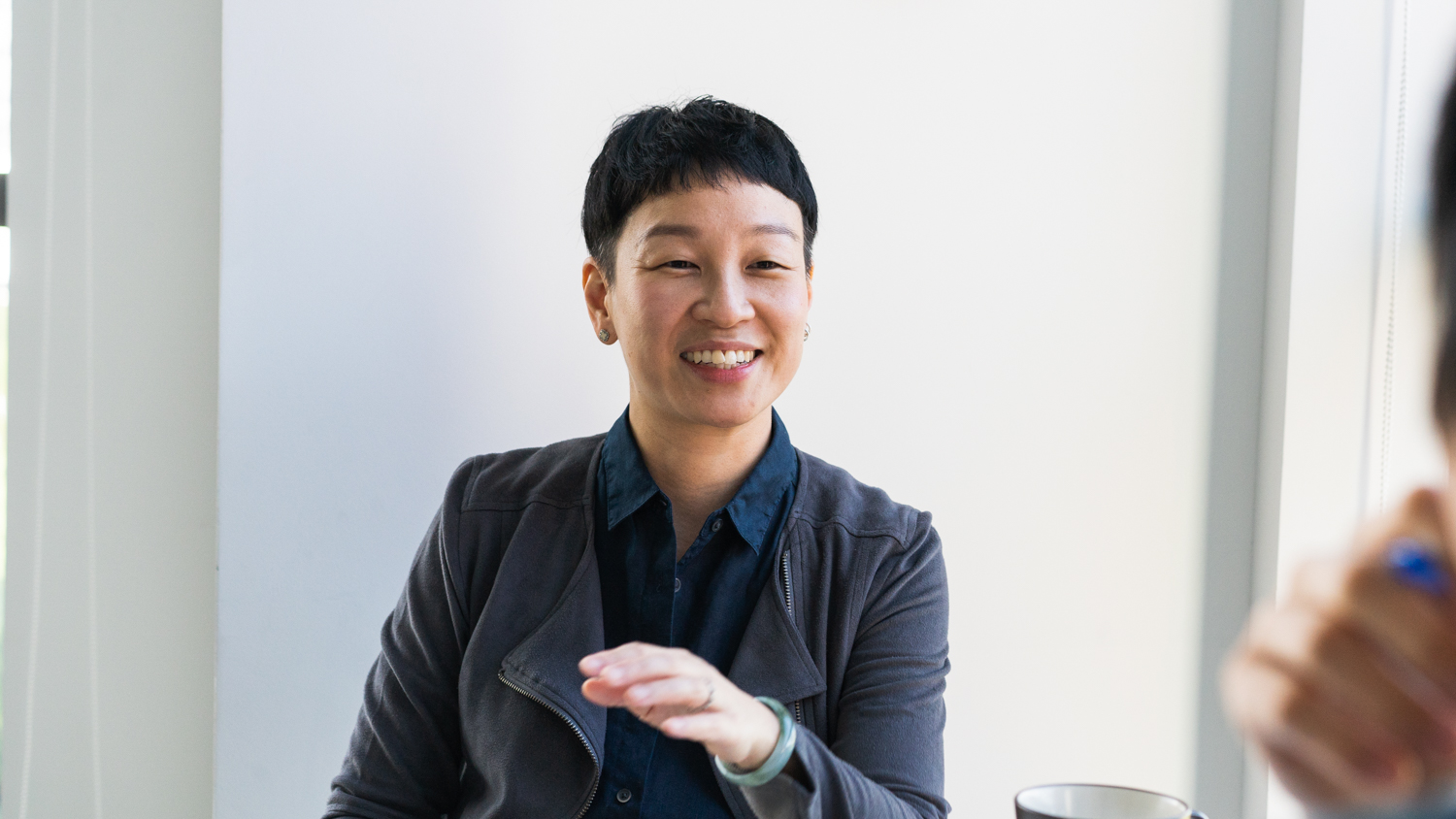 Image by James Spencer
Image by James Spencer
Forming Red Dot United
In that sense, RDU is shaping up to be the culmination of Lee's ideological vision.
Soon after Philemon left the PSP, Lee caught up with him and had discussions which she described as "energising".
"What happened with RDU is that, once again it happened quite quickly. As you can see it's really been very unexpected. It's really not something that me and Ravi have planned for a long time — at least not for me.
So I reached out to him and then he shared what were some of his thoughts, and what were some of the things that we want to see happen for Singapore politically. We've always gotten along well, and it was very pleasant conversations and we were very like-minded."
The party may want to steer clear of being driven by a singular personality, but it's hard to ignore how RDU takes after Lee's own sunny, almost utopian, disposition.
For RDU, as it has been for Lee her entire political career, giving Singaporeans a chance to hear an alternative perspective and creating awareness of the different options available to voting citizens take top priority."What we're trying to achieve is really to reach out to the hearts and minds of Singaporeans and help them to achieve that balanced perspective of whats going on around them so that they can make their own choices.
I think that is slightly different from the other parties because to us, your freedom of choice and your opinion is extremely important. As long as it's balanced and reasoned and an informed perspective, we respect whatever opinion and choice you have."
That is why the party has readied themselves to go straight into the lion's den this General Election.
Vowing to avoid three-cornered fights, Lee said that discussions with the other political parties seemed to indicate many are avoiding Jurong GRC.
For good reason too. Jurong had seen the biggest margin of victory for the PAP at GE2015, where a team led by the ever-popular Tharman Shanmugaratnam won with nearly 80 per cent of the votes.
However, Lee is undaunted by the short runway RDU has. This contest — which she acknowledged may not even happen should another opposition party decide to run in Jurong — seems more a decision based on ideals rather than cunning strategy.
"We may step forward, but it's to let Singaporeans know what RDU stands for, to let them have a voice, and to have a role to play in the process."
Lee admitted that this General Election will be "very, very difficult" for the opposition, but explained that the party has longer-term plans in mind.
"Our promise to people is that we're not going to disappear after the GE. That we're going to be present.
We want to be a magnet for like-minded people, who share the same values and principles to come forward and grow into a party that is strong enough to be heard and taken very seriously — who then has an impact on government whether we are in government or not."
Top image by James Spencer
If you like what you read, follow us on Facebook, Instagram, Twitter and Telegram to get the latest updates.
